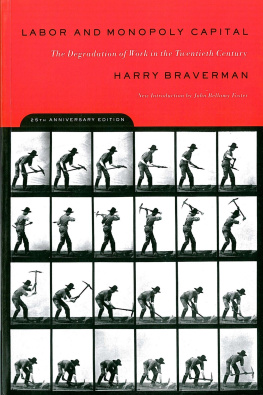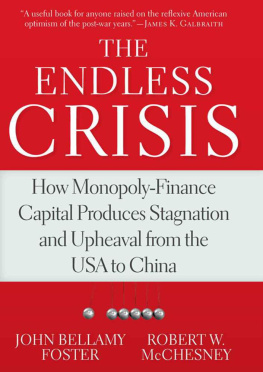Bellamy Foster John - The Age of Monopoly Capital
Here you can read online Bellamy Foster John - The Age of Monopoly Capital full text of the book (entire story) in english for free. Download pdf and epub, get meaning, cover and reviews about this ebook. year: 2017, publisher: Monthly Review Press, genre: Art. Description of the work, (preface) as well as reviews are available. Best literature library LitArk.com created for fans of good reading and offers a wide selection of genres:
Romance novel
Science fiction
Adventure
Detective
Science
History
Home and family
Prose
Art
Politics
Computer
Non-fiction
Religion
Business
Children
Humor
Choose a favorite category and find really read worthwhile books. Enjoy immersion in the world of imagination, feel the emotions of the characters or learn something new for yourself, make an fascinating discovery.

- Book:The Age of Monopoly Capital
- Author:
- Publisher:Monthly Review Press
- Genre:
- Year:2017
- Rating:4 / 5
- Favourites:Add to favourites
- Your mark:
- 80
- 1
- 2
- 3
- 4
- 5
The Age of Monopoly Capital: summary, description and annotation
We offer to read an annotation, description, summary or preface (depends on what the author of the book "The Age of Monopoly Capital" wrote himself). If you haven't found the necessary information about the book — write in the comments, we will try to find it.
The Age of Monopoly Capital — read online for free the complete book (whole text) full work
Below is the text of the book, divided by pages. System saving the place of the last page read, allows you to conveniently read the book "The Age of Monopoly Capital" online for free, without having to search again every time where you left off. Put a bookmark, and you can go to the page where you finished reading at any time.
Font size:
Interval:
Bookmark:
THE PAUL A. BARAN PAUL M. SWEEZY MEMORIAL AWARD
The Age of Monopoly Capital is the second winner of the Paul A. BaranPaul M. Sweezy Memorial Award, following Imperialism in the Twenty-First Century, by John Smith. This award, established in 2014, honors the contributions of the founders of the Monthly Review tradition: Paul M. Sweezy, Paul A. Baran, and Harry Magdoff. It supports the publication in English of distinguished monographs focused on the political economy of imperialism. The aim is to make available in English important work written in the tradition of Paul M. Sweezy, Paul A. Baran, and Harry Magdoff, broadly conceived. It will also apply to writings previously unpublished in English, and will include translations of new work first published in languages other than English.

Paul M. Sweezy co-founded Monthly Review in 1949, and, with Paul A. Baran, developed the fundamental analysis of accumulation under monopoly capitalism. Barans The Political Economy of Growth, published in 1957, set the template for understanding imperialism in the latter part of the twentieth centuryan argument that was to be further developed in Baran and Sweezys Monopoly Capital (1966). Harry Magdoff, who would become the co-editor of Monthly Review, carried this project forward in The Age of Imperialism (1969) by investigating the historical trajectory of imperialism and tracing the contours of monopoly capitalism as a world system of exploitation. Their collective effort helped form a current of independent socialist thought of increasing importance on a global scale.
Today, the struggle continues against a global capitalist system that has created conditions of increased exploitation in the countries of the global South, alongside a vast transfer of wealth to imperialist centers of the global North. While untold profits accrue to imperialisms ruling elitethe 1 percent of society at home and abroadthe 99 percent of the worlds population experience greater hardship and misery. The imperial system of the twenty-first century is one marked by growing uncertainty, instability, and ecological disaster. The promise of national emancipation through independence has not been fulfilled in general. Capitalist globalization is in fact imperialism without colonies.
Please visit our website for complete details of the award.
Selected Correspondence of Paul A. Baran
and Paul M. Sweezy, 19491964
Edited by NICHOLAS BARAN
and JOHN BELLAMY FOSTER

Copyright 2017 by Monthly Review Press
All Rights Reserved
Library of Congress Cataloging-in-Publication data:
Names: Baran, Paul A., author. | Sweezy, Paul M. (Paul Marlor), 19102004, author. | Baran, Nicholas, editor. | Foster, John Bellamy, editor.
Title: The age of monopoly capital : selected correspondence of Paul A. Baran and Paul M. Sweezy, 19491964 / edited by Nicholas Baran and John Bellamy Foster.
Description: New York : Monthly Review Press, [2017] | Includes bibliographical references and index.
Identifiers: LCCN 2017018385 (print) | LCCN 2017028759 (ebook) | ISBN 9781583676530 (trade) | ISBN 9781583676547 (insitutional) | ISBN 9781583676523 (hardcover)
Subjects: LCSH: Baran, Paul A.Correspondence. | Baran, Paul A. Monopoly capital. | Sweezy, Paul M. (Paul Marlor), 19102004Correspondence. | EconomistsUnited StatesCorrespondence. | EconomicsUnited StatesHistory20th century.
Classification: LCC HB119.B3 (ebook) | LCC HB119.B3 A4 2017 (print) | DDC 330.092/2dc23
LC record available at https://lccn.loc.gov/2017018385
MONTHLY REVIEW PRESS, NEW YORK
monthlyreview.org
5 4 3 2 1
by Nicholas Baran
by John Bellamy Foster
In memory of Paul Alexander Baran and Paul Marlor Sweezy and their great friendship
by Nicholas Baran
THE CORRESPONDENCE OF PAUL BARAN AND PAUL SWEEZY in the 1950s and early 1960s is one of the great unknown legacies of Marxian political economy in the United States. This book is the culmination of over two years of work, converting approximately eight hundred letters to Microsoft Word so that they could be published. The entire collection of letters is now available online in PDF format at the Paul A. Baran Archive at Stanford University. This book is a collection of selected correspondence, focused primarily on letters that illuminate Baran and Sweezys intellectual and theoretical exchanges, with the more personal and extraneous exchanges omitted.
In discussing the letters between my father and his best friend and colleague Paul Sweezy, the best place to start is with the first two paragraphs of Sweezys Paul A. Baran: A Personal Memoir, part of the short book published by Monthly Review Press shortly after Barans death in March of 1964:
I first met Paul Baran shortly after he came to this country in the fall of 1939. I was teaching at Harvard, and he looked me up in Cambridge, bringing with him a letter of introduction from our mutual friend Oskar Lange who was then a professor of economics at the University of Chicago.
Paul had a very powerful personality, and one could be attracted to him immediately on meeting him, just as one could take an immediate dislike to him. He and I were drawn together at once and our intellectual and personal friendship became ever closer and more meaningful to both of us during the next 25 years. As it happens, however, we never for long lived in the same locality, so that much of our discourse was perforce by written word. While he was alive I always found this deplorable. But now that he is gone I can appreciate its positive side. Up until about 1950, we corresponded
Sweezy never got around to publishing that volume, but fortunately he did save the file of letters, which amounts to some 1,000 single-spaced typewritten pages. The Baran-Sweezy letters not only reveal the remarkable personal and intellectual friendship between the two men but also chronicle a crucial period in the history of socialist economic thought and Cold War politics: the Marshall Plan and the division of Germany, Eastern Europe, the Korean War, the Eisenhower-Stevenson election, the McCarthy era and its academic witch hunt, the Soviet invasion of Hungary, the Cuban Revolution and the prospect of other revolutions in Latin America, the Sino-Soviet split, and the rise of China in the socialist world. The letters report these events contemporaneously, from Barans and Sweezys perspectives as they were occurring, without the benefit of hindsight. One of the key tenets of Marxism is to apply historical perspective to the analysis of social and economic conditions. These letters provide a remarkable historical perspective on the events of the time. They illuminate the issues that faced supporters of socialism living in the capitalist world, particularly within the American academy and in the United States in general.
The other and perhaps most important thread in the letters is, to paraphrase Sweezy, the trying out of ideas on each other and the development of those ideas through discussion and criticism. These letters quite literally represent the foundation of their book, Monopoly Capital, as many passages in it are taken verbatim from the letters. In them, Baran worked out his version of the economic surplus theory, which laid the groundwork for his book
Next pageFont size:
Interval:
Bookmark:
Similar books «The Age of Monopoly Capital»
Look at similar books to The Age of Monopoly Capital. We have selected literature similar in name and meaning in the hope of providing readers with more options to find new, interesting, not yet read works.
Discussion, reviews of the book The Age of Monopoly Capital and just readers' own opinions. Leave your comments, write what you think about the work, its meaning or the main characters. Specify what exactly you liked and what you didn't like, and why you think so.










